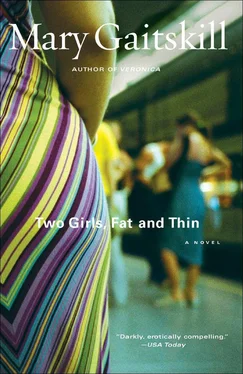Mary Gaitskill - Two Girls, Fat and Thin
Здесь есть возможность читать онлайн «Mary Gaitskill - Two Girls, Fat and Thin» весь текст электронной книги совершенно бесплатно (целиком полную версию без сокращений). В некоторых случаях можно слушать аудио, скачать через торрент в формате fb2 и присутствует краткое содержание. Год выпуска: 2012, Издательство: Simon & Schuster, Жанр: Современная проза, на английском языке. Описание произведения, (предисловие) а так же отзывы посетителей доступны на портале библиотеки ЛибКат.
- Название:Two Girls, Fat and Thin
- Автор:
- Издательство:Simon & Schuster
- Жанр:
- Год:2012
- ISBN:нет данных
- Рейтинг книги:5 / 5. Голосов: 1
-
Избранное:Добавить в избранное
- Отзывы:
-
Ваша оценка:
- 100
- 1
- 2
- 3
- 4
- 5
Two Girls, Fat and Thin: краткое содержание, описание и аннотация
Предлагаем к чтению аннотацию, описание, краткое содержание или предисловие (зависит от того, что написал сам автор книги «Two Girls, Fat and Thin»). Если вы не нашли необходимую информацию о книге — напишите в комментариях, мы постараемся отыскать её.
Review) create a haunting and unforgettable journey into the dark side of contemporary life and the deepest recesses of the soul.
Two Girls, Fat and Thin — читать онлайн бесплатно полную книгу (весь текст) целиком
Ниже представлен текст книги, разбитый по страницам. Система сохранения места последней прочитанной страницы, позволяет с удобством читать онлайн бесплатно книгу «Two Girls, Fat and Thin», без необходимости каждый раз заново искать на чём Вы остановились. Поставьте закладку, и сможете в любой момент перейти на страницу, на которой закончили чтение.
Интервал:
Закладка:
“I’ve been thinking about you too,” she lied.
“That’s nice.”
“I’d love to see you, it’s just I can’t now. If I get this done tonight, maybe tomorrow.”
They hung up civilly. She continued writing. “This cultural utopia of greed, expressed in gentrification and the slashing of social programs, has had its spokesperson and prophet for the last fifty years, a novelist whose books are American fantasies that mirror, in all its neurotic excess, the frantic twist to the right we are now experiencing. Anna Granite, who coined the term ‘the Truth of Selfishness,’ has been advocating the yuppie raison d’être since the early forties; it is only now that her ideas are being lived out, in mass culture and in government.”
The phone rang again.
“How about if I just come over and whip you and then leave so you can keep working?”
She hung up, cursed, unplugged the phone, and kept writing.
Chapter Twenty-Four
Justine had said that she would call me when the article was going to appear in the Vision , and I believed her. I knew that it often took months for magazines to print articles, so I wasn’t suspicious or impatient when two months passed without my hearing from her. I kept it in the back of my mind like a present to be opened when the time was right. I imagined reading it and then meeting with Justine to discuss it. I would praise her overall insight and then criticize the finer points of her analysis, instructing her in how she might present her arguments better in the future. I imagined her following my finger with her eyes as it traced the place she had gone slightly awry in her article, I imagined her humbly nodding.
But she didn’t call me.
I was leaving work after a grueling twelve-hour shift. It was 10:00 A.M., and I was exhausted. Tiny particles of paranormal light swam before my eyes; the day workers, with their bright, tense faces, their jaunty manic walks, swinging purses and dangling belts were an onslaught. I made my way out of the building, bubbles of disorientation popping about my head.
Ordinarily I rode a company car home from work, but at this hour it was faster to take the subway, so I went to the nearest noise-boiling pit. The train was delayed, or so I deduced from the mangled voice that roared from the speakers above us. The mob on the platform grew in number, everyone bearing down hard on the track of daily habit, staring into the maw of the impending day, pacing in insect circles, pitching their thoughts and feelings into the future or the past, anywhere but the subway.
I spotted a concession stand and thought of little mints and chewy candies. I made my way towards the booth to participate in the mechanical ballet of giving and receiving choreographed by the muttering man behind the counter. As I waited my turn I scanned the magazines and papers, the horrific headlines and happy faces that help give form to our inchoate and vulnerable mass psyche. I looked rather fondly at the Vision —yet another headline about the political import of some rock band — and absently turned the front page to stare at the table of contents. “Anna Granite,” it said, “Yuppie Grandmother — by Justine Shade.”
The snottiness of it was like a bracing blow to the face — but I recovered. Probably Justine had nothing to do with the headline, and not everyone used the word “yuppie” pejoratively. I muffed my part in the newsstand ballet by turning to walk away with the paper without paying, and the newsman screamed at me, scowling at my cheerful attempts at explanation. I paid for it and opened it — there it was again! That classic photograph of Granite’s imperial face, so long absent from public pages! My pleasure rose and combined with my exhaustion, and for a moment my brain came undone from its dense gray coils and merrily bobbed in the colorful miasma of irrationality. I started to read, and the subway came bawling into view. I folded the paper under my arm and fought savagely for a seat so I could comfortably read, shamelessly using my size and weight to get my way. People glared, but I didn’t care. I was smiling insanely as I opened the paper. I was puzzled, even in my magnanimous state, by her first sentence and its metaphor of the bad novel. I was still game though and read on; I became even more puzzled. “Yuppies, power breakfasts, the leering, double-crossing bed-hoppers of ‘Dynasty’ and ‘Dallas’ stalking their victims in glitzy gowns, a national obsession with exercise and physical perfection, a riot of matching spider-limbed furniture, surreal TV Prayathons. ” What did this have to do with Anna Granite? She went on in this irrelevant way until I began to think I was reading the wrong article. Then: “It sounds like a bad novel and it is.” My distended happiness hemorrhaged in inky black spurts as I was lashed in the face with that serpentine phrase “a novelist whose books are American fantasies that mirror, in all its neurotic excess, the frantic twist to the right we are now experiencing.”
“That bitch,” I said, “that goddamn bitch.”
The nyloned thighs to my right shifted away from me.
I read on, my concentration now razor sharp. She went on to describe Granite’s influence and its present day manifestations: the taped lectures, the yearly Philadelphian gatherings, the Definitist courses offered at various small colleges, an expensive three-day workshop held in Honolulu, the Rationalist Reaffirmation School, and the fact that Knight Ludlow, “highly placed city financial analyst” had been her “personal protégé.”
“Her novels,” continued Justine “are like phantom comic-book worlds shadowing, in exaggerated Kabuki-like form, the psychological life and anxieties of our society.”
“Shit!” I muttered. “A comic book! A comic book!” I turned to the young black woman on my right with some vague idea of showing her I wasn’t another subway madwoman. “Have you read this?” I asked.
She glanced at me, more with her face than her eyes, tightly shook her head “no” and returned her attention to her paperback.
“Well if you do, you ought to know it’s crap, one hundred percent. I know the writer and I know the person it’s about. I was interviewed by this. writer and it’s a vindictive piece of falsification.” She ignored me. Well to hell with you, I thought. I looked at the people across from me. They were staring resolutely in every direction but mine. I cracked the paper assertively and continued reading.
Justine went on for several paragraphs in that breezy pop Vision -speak, invoking television shows, movies, and media jokes about the inner conflicts of American psychology — the “pop icon” of the lone hero versus the “pathological” desire to be part of the crowd, the assumption that the strong individual is somehow inherently in opposition to society. “This confusion extends most painfully into the conflicting American attitude towards money,” pontificated the bitch. “Does an individual with money have a responsibility to society and does the government have a moral right or obligation to oversee this responsibility? This question is overlaid with an almost pornographic fascination with money and people who have it. ”
I had to concede it was interesting; if it hadn’t been in the service of trashing Granite, I might’ve enjoyed it. Why, I thought in anguish, did intelligent people always try to undermine Granite, even now? “Anna Granite’s novels not only shadow the back-and-forth, one-or-the-other nature of this struggle, they purport to resolve it.” This was followed by an unfair caricature of Granite’s theories concluding with “she reduced the complex dilemma of the individual in society down to either/or moralistic terms couched in the dramatic devices and gestural glitz of a soap opera.”
Читать дальшеИнтервал:
Закладка:
Похожие книги на «Two Girls, Fat and Thin»
Представляем Вашему вниманию похожие книги на «Two Girls, Fat and Thin» списком для выбора. Мы отобрали схожую по названию и смыслу литературу в надежде предоставить читателям больше вариантов отыскать новые, интересные, ещё непрочитанные произведения.
Обсуждение, отзывы о книге «Two Girls, Fat and Thin» и просто собственные мнения читателей. Оставьте ваши комментарии, напишите, что Вы думаете о произведении, его смысле или главных героях. Укажите что конкретно понравилось, а что нет, и почему Вы так считаете.












